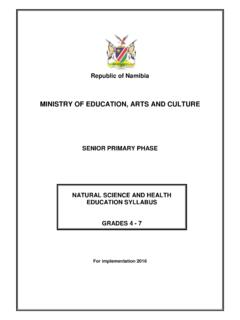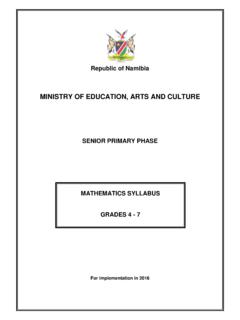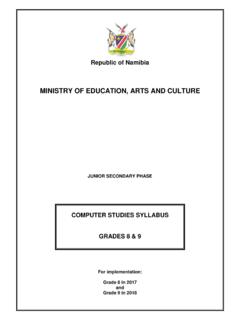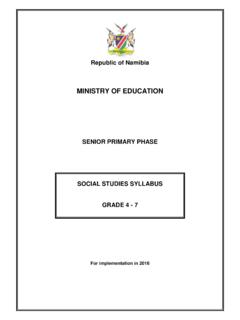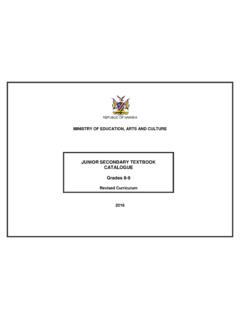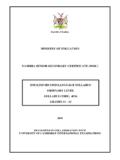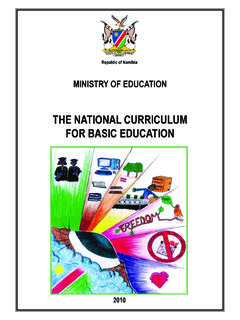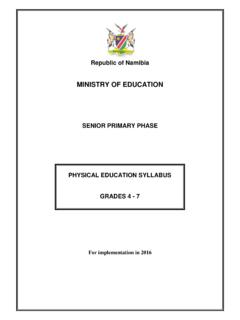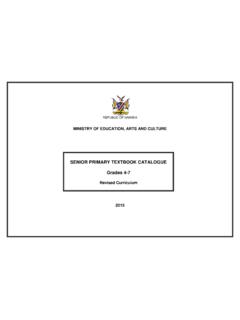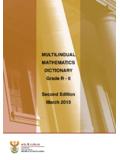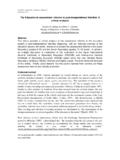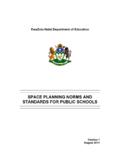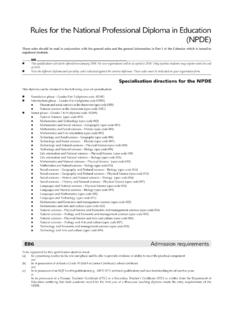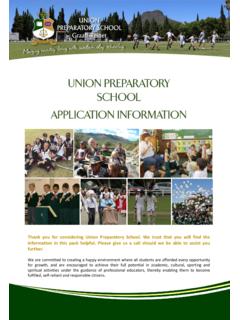Transcription of MINISTRY OF EDUCATION, ARTS AND CULTURE …
1 Republic of Namibia MINISTRY OF education , arts AND. CULTURE . senior primary PHASE. ELEMENTARY AGRICULTURE SYLLABUS. GRADES 5-7. FOR IMPLEMENTATION IN 2016. MINISTRY of education , arts and CULTURE National Institute for Educational Development (NIED). Private Bag 2034. Okahandja Namibia Copyright NIED, MINISTRY of education , 2014. Elementary Agriculture Syllabus Grades 5-7. ISBN: 0-86976-856-5. Printed by NIED. Website: Publication date: December 2014. Table of Contents 1. Introduction .. 1. 2. Rationale .. 1. 3. Aims.
2 1. 4. Inclusive education .. 1. 5. Links to other subjects and cross-curricular issues .. 2. 6. Approach to teaching and learning .. 3. 7. End of phase 8. Summary of the learning content .. 5. 9. Learning 7. Grade 5 .. 7. Grade 6 .. 11. Grade 7 .. 15. 10. Assessment .. 22. Types and methods of assessment .. 22. Grade descriptors .. 24. Assessment objectives .. 25. Continuous assessment: detailed guidelines .. 25. Types of continuous assessment .. 25. End of year examinations: detailed guidelines .. 26. 11. Promotion marks.
3 27. 12. Specification grids .. 28. 13. Assessment criteria .. 28. 14. Additional information .. 31. Annexe 1: Terms used in teaching and assessment .. 31. Annexe 2: Assessment record sheet for Grades 5-7 .. 32. 1. Introduction This syllabus describes the intended learning and assessment for Elementary Agriculture in the senior primary level. As a subject Elementary Agriculture is within the natural scientific area of learning in the national curriculum, but has thematic links to others subjects across the curriculum.
4 Learning experiences in the natural scientific area aim at increasing the learners' knowledge and understanding of the physical and biological world of which they are part. This includes understanding how people use the natural environment to satisfy human needs, and how the environment may be changed in ecologically sustainable ways. Critical thinking, investigating phenomena, interpreting data, and applying knowledge to experimental skills are essential to understanding the value and limitations of natural scientific knowledge and methods, and their application to daily life.
5 The application of scientific knowledge and attitudes to health is of special relevance for the individual, the family, and society as a whole. 2. Rationale Learning experiences in the natural scientific area are focused upon promoting the teaching and learning for understanding. Namibia, like most African countries is rich in natural resources, which requires scientific knowledge and technical skills for the exploration of these resources. The acquisition of scientific knowledge and technical skills presents itself as a prerequisite for a progressive national economy and the improvement of better standard of life for our people as envisaged in the country's long term strategic plan of vision 2030.
6 It thus important for our learners to acquire knowledge and skills which will foster their understanding of the interaction of human being and the environment in order to satisfy human needs. It must be understood that both the physical and biological world around us is quite complex and therefore need to be understood in a holistic manner by the society in order to sustain the natural resources. 3. Aims The main aim of the Elementary Agriculture syllabus within the natural scientific area is therefore to provide basic scientific and technical background for our learners with the hope of producing the much-needed scientists and agriculturalists for the country.
7 Another major aim of offering Elementary Agriculture in primary schools is to lay the foundation for the development of human resources as a basis for further studies, occupations or self- employment. The Namibian society needs to be scientifically literate and acquire entrepreneurship skills if they are to cope up with challenges of appropriate global technology and economic advancement of the country. 4. Inclusive education Inclusive education is the right of every learner and promotes participation in, or access to, the full range of educational programmes and services offered by the education system in mainstream schools.
8 It is based on the principle of supporting and celebrating the diversity found among all learners and removing all barriers to learning. Basic education prepares the society, as envisaged in Namibia's Vision 2030, by promoting inclusivity. Learners experiencing barriers to learning and other individual needs will be included in a mainstream school and their needs will be attended to through differentiation of teaching methods and materials as required. Learners, who are so severely impaired that they cannot benefit from attending inclusive schools, will be provided for according to their needs in learning support units, resource units or resource schools until such time that they can join the inclusive school where applicable.
9 The curriculum, teaching methods and materials are adapted for learners in these institutions. The learner-centred approach to teaching is highly suitable for learners with special learning needs since it capitalises on what learners already know and can do, and then assists them 1. Elementary Agriculture senior primary Syllabus Grades 5 7, NIED 2014. to acquire new knowledge and skills. The curriculum framework for Inclusive education specifies the competencies which learners with special learning needs should master.
10 Individual learning support plan (ILSP) should be in place to guide and evaluate the individual learning process for learners with special learning needs. Further guidelines on planning for learning and teaching in an inclusive classroom can be found in the curriculum framework for Inclusive education (2014). These guidelines will help to equip all learners with knowledge, skills and attitudes to help them succeed in the world that is increasingly complex, rapidly changing and rich in information and communication technology.
